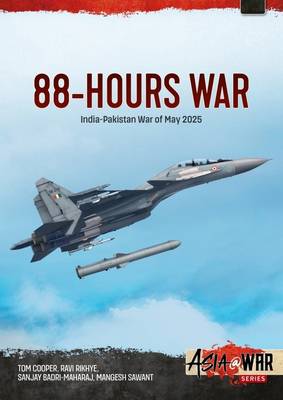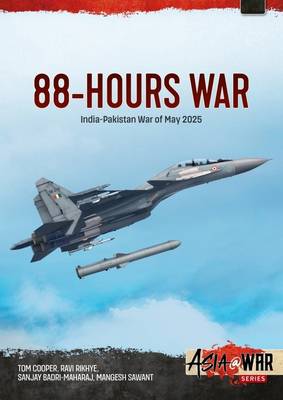
- Retrait en 2 heures
- Assortiment impressionnant
- Paiement sécurisé
- Toujours un magasin près de chez vous
- Retrait gratuit dans votre magasin Club
- 7.000.0000 titres dans notre catalogue
- Payer en toute sécurité
- Toujours un magasin près de chez vous
88-Hours War
India-Pakistan War of May 2025
Tom Cooper, Ravi Rikhye, Sanjay Badri-Maharaj, Mangesh Sawant
41,95 €
+ 83 points
Description
Much downplayed, even ignored, short but sharp military confrontation between India and Pakistan, fought in the course of less than four days of May 2025 was an affair that saw the deployment of some of most advanced weapons systems currently in operation. Widely mis-declared into a mere continuation of the Kashmir Conflict, a 'large-scale cross-border skirmish', a 'drone battle' that ended with both sides announcing a ceasefire and a victory, 'actually' ending when the administration of US President Donald Trump played a deal-broker, a peace-maker, and saviour of both Asian nations, it is going to determine relations between the two nuclear powers for decades in advance.
On 22 April 2025, a terrorist attack outside Pahalgam in Indian-administered Jammu and Kashmir killed 26 civilians, mostly Hindu tourists. A Pakistan-based, UN-designated terrorist group first claimed responsibility, then denied involvement, while official Islamabad - which plotted this affair with the aim of drawing world-wide attention to the Kashmir issue - declared the massacre a 'false flag operation' orchestrated by India. The government in New Delhi reacted by retaliatory measures before, after finding undisputable evidence about Pakistan's involvement, early on 7 May 2025, launching a series of retaliatory strikes on camps of multiple terror organisations. Insistent on dictating India's foreign policy, on preventing such counter-strikes through threats with deployment of nuclear weapons, and mythology about invincibility of its armed services, Islamabad then miscalculated: it launched attacks against civilian-, military-, and religious objects in Indian-administered Jammu, using mortars, artillery rockets and unmanned aerial vehicles (UAVs).
Much to Pakistan's surprise, India reacted by launching a carefully orchestrated, measured operation against Pakistani air defences. Over the following two days, Pakistan continued escalating its 'drone war'. However, the mass of its weaponry was shot down, rendering its retaliation entirely ineffective. At that point, Islamabad ordered ballistic missile attacks on 26 targets in India. New Delhi reacted with a devastating missile strike that, in matter of 90 minutes, disabled multiple major command centres, blocked the runways on several PAF air bases, and demolished hangars housing some of most important aircraft of its opponent. As a cup on cake, India completed its methodical onslaught by targeting at least one, possibly two underground nuclear weapons storage facilities, clearly demonstrating its superior position.
While certainly fuelled by the conflict over Kashmir, the India-Pakistan War of May 2025 was much more, and its outcome is going to dictate the relations between two nuclear powers for decades in advance. For the first time in 80-years-long history of enmity between the two nations, India not only dared to openly strike back at Pakistan in reaction to a terror attack the latter has instigated, but called its persistent threats with nuclear retaliation a bluff, neutralised the country's air defences and ability to retaliate, forced the PAF away from the international border thus bringing the IAF into a position to strike selected targets, and forced Islamabad to request an end to hostilities. Although Pakistani government - skilfully supported by Chinese propaganda warfare, and usual Western favouritism and ignorance - successfully covered-up the extension of its defeat, even declared itself for victorious, relations between the two countries are never going to be the same again.
Richly illustrated by custom-drawn diagrams and colour profiles, the book 88-Hours War is providing full backgrounds and context to this little-understood conflict, a detailed description of the involved technology, and a blow-by-blow account of the fighting from 7 to 10 May 2025. As such, it is an indispensable source of reference for both professionals and enthusiasts alike.
On 22 April 2025, a terrorist attack outside Pahalgam in Indian-administered Jammu and Kashmir killed 26 civilians, mostly Hindu tourists. A Pakistan-based, UN-designated terrorist group first claimed responsibility, then denied involvement, while official Islamabad - which plotted this affair with the aim of drawing world-wide attention to the Kashmir issue - declared the massacre a 'false flag operation' orchestrated by India. The government in New Delhi reacted by retaliatory measures before, after finding undisputable evidence about Pakistan's involvement, early on 7 May 2025, launching a series of retaliatory strikes on camps of multiple terror organisations. Insistent on dictating India's foreign policy, on preventing such counter-strikes through threats with deployment of nuclear weapons, and mythology about invincibility of its armed services, Islamabad then miscalculated: it launched attacks against civilian-, military-, and religious objects in Indian-administered Jammu, using mortars, artillery rockets and unmanned aerial vehicles (UAVs).
Much to Pakistan's surprise, India reacted by launching a carefully orchestrated, measured operation against Pakistani air defences. Over the following two days, Pakistan continued escalating its 'drone war'. However, the mass of its weaponry was shot down, rendering its retaliation entirely ineffective. At that point, Islamabad ordered ballistic missile attacks on 26 targets in India. New Delhi reacted with a devastating missile strike that, in matter of 90 minutes, disabled multiple major command centres, blocked the runways on several PAF air bases, and demolished hangars housing some of most important aircraft of its opponent. As a cup on cake, India completed its methodical onslaught by targeting at least one, possibly two underground nuclear weapons storage facilities, clearly demonstrating its superior position.
While certainly fuelled by the conflict over Kashmir, the India-Pakistan War of May 2025 was much more, and its outcome is going to dictate the relations between two nuclear powers for decades in advance. For the first time in 80-years-long history of enmity between the two nations, India not only dared to openly strike back at Pakistan in reaction to a terror attack the latter has instigated, but called its persistent threats with nuclear retaliation a bluff, neutralised the country's air defences and ability to retaliate, forced the PAF away from the international border thus bringing the IAF into a position to strike selected targets, and forced Islamabad to request an end to hostilities. Although Pakistani government - skilfully supported by Chinese propaganda warfare, and usual Western favouritism and ignorance - successfully covered-up the extension of its defeat, even declared itself for victorious, relations between the two countries are never going to be the same again.
Richly illustrated by custom-drawn diagrams and colour profiles, the book 88-Hours War is providing full backgrounds and context to this little-understood conflict, a detailed description of the involved technology, and a blow-by-blow account of the fighting from 7 to 10 May 2025. As such, it is an indispensable source of reference for both professionals and enthusiasts alike.
Spécifications
Parties prenantes
- Auteur(s) :
- Editeur:
Contenu
- Nombre de pages :
- 88
- Langue:
- Anglais
- Collection :
Caractéristiques
- EAN:
- 9781806720859
- Date de parution :
- 31-01-26
- Format:
- Livre broché
- Format numérique:
- Trade paperback (VS)
- Dimensions :
- 210 mm x 298 mm

Seulement chez Librairie Club
+ 83 points sur votre carte client de Librairie Club
Les avis
Nous publions uniquement les avis qui respectent les conditions requises. Consultez nos conditions pour les avis.





